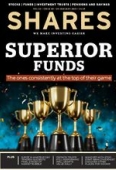Archived article
Please note that tax, investment, pension and ISA rules can change and the information and any views contained in this article may now be inaccurate.
How I invest: Using the strategies of Terry Smith and Nick Train to generate income

Following the professionals and mirroring what they do has long been a strategy used by some investors.
John from Ruislip is among that group and follows the strategies of three well-known UK fund managers – Terry Smith, Nick Train and Keith Ashworth-Lord.
He believes ‘they all clearly define their strategies, so they are easy to copy, they act as my mentors’, and has been in contact with all three. Despite being busy he adds they have all been willing to correspond with him directly and give him ‘helpful responses’.
Explaining why he chose those three, John adds: ‘My main goal was to identify a method or methods of investing which were attractive to me in terms of risk to reward ratio. I partially achieved this goal after the financial crash of 2008 by investing in low risk funds, such as those run by Ruffer and Troy Asset Management, with a track record of preserving capital, although this approach significantly reduced returns.
‘I did not fully achieve my goal until 2011 when I became aware of the type of approach used by Terry Smith which, in my opinion, provides a great deal more upside in return for relatively little extra risk.’
He believes ‘the wisdom of this approach was subsequently confirmed by the success of other fund managers, notably as Nick Train and Keith Ashworth-Lord who, in my opinion, have philosophies which have a lot in common with Terry Smith.’
RELIANCE ON PENSIONS
John is semi-retired and his wife is retired. Most of their income is from work-related pensions and from one of his SIPPs, and occasionally he cashes in investments accumulated outside of their pensions to supplement their income.
His state pension starts this year at the same time as his mortgage is paid off, and he says this will mean that he will no longer have to sell any investments to generate income, unless making large one-off purchases such as buying a car.
John doesn’t have any particular investment goals in terms of money saved or things he might want to own, but rather, with a professional background in the biotech sector as a biological scientist, he sees investing as ‘something akin to a scientific challenge’.
PERSONAL INVESTMENTS
In his portfolio at the moment are open-ended funds or investment trusts run or overseen by Smith, Train and Ashworth-Lord – including Fundsmith Equity (B4Q5X52), Lindsell Train UK Equity (B18B9X7) and CFP SDL Buffettology (BF0LDZ3) – and John believes the ‘type of buy and hold approach used by these fund managers provides an attractive risk to reward ratio’.
He also holds individual shares selected by the above managers in their own funds, held directly to avoid fund management fees, as well as shares of small to medium sized companies selected by applying the methods of the managers.
In some cases these companies are too small to be included in their funds, he says, but believes they ‘also provide a good risk to reward ratio’.
LIFE SCIENCE INTEREST
Two of the stocks he highlights are life science research tools supplier Abcam (ABC:AIM) and antibodies developer Bioventix (BVXP:AIM), and he believes both their business models are ‘attractive for a number of reasons’, including the fact their products are consumables ‘so they generate a lot of repeat business from the same customers’.
Both Bioventix and Abcam produce reagents (typically antibodies), he explains, which in the case of Abcam are used to produce its own tests/assays and are also widely sold for researchers to produce their own tests/assays. In the case of Bioventix these reagents are supplied to other companies for use in their commercial tests/assays.
On Abcam, he believes sales are distributed ‘over a huge number of customers (it has been described as the Amazon of research antibodies) so there is little reliance on any one customer’.
The markets for these products are growing steadily as the role of biotechnology in developing new products increases, he explains, and John believes the response to the Covid-19 pandemic ‘is a good example of how biotech can be used to develop products to solve particular problems in the medical field.’
YEARS OF EXPERIENCE
John has been investing for more than 35 years and while he has some success, there have also been some investments which haven’t worked so well.
Regarding these, John provides a cautionary tale. He says: ‘My worst investment decision was to believe the CEO of a speciality pharmaceutical company who, at a press conference in 2002, painted a very positive picture of his company’s prospects and this was one reason why I increased my investment in the company.
‘Unknown to the market, it seems he was involved in last-ditch attempts to renegotiate the company’s banking covenants owing to the company’s debt burden becoming unmanageable. The market was shocked when the company went into administration a few months later.
‘I learnt two very important lessons from this loss. Firstly, I take anything said by a company’s management with a large pinch of salt no matter how convincing they sound and secondly, I do not invest in companies which have a significant amount of debt. These lessons have been very valuable.’
WOULD YOU LIKE TO FEATURE AS A CASE STUDY IN SHARES?
We are looking for individuals or couples who can discuss their experience with investing and some details about their portfolios.
Anyone interested should email editorial@sharesmagazine.co.uk with ‘case study’ in the subject line.
DISCLAIMER: Please note, we do not provide financial advice in case study articles and we are unable to comment on the suitability of the subject’s investments. Individuals who are unsure about the suitability of investments should consult a suitably qualified financial adviser. Past performance is not a guide to future performance and some investments need to be held for the long term. Shares’ editor Daniel Coatsworth has a personal investment in Fundsmith Equity referenced in this article.
Important information:
These articles are provided by Shares magazine which is published by AJ Bell Media, a part of AJ Bell. Shares is not written by AJ Bell.
Shares is provided for your general information and use and is not a personal recommendation to invest. It is not intended to be relied upon by you in making or not making any investment decisions. The investments referred to in these articles will not be suitable for all investors. If in doubt please seek appropriate independent financial advice.
Investors acting on the information in these articles do so at their own risk and AJ Bell Media and its staff do not accept liability for losses suffered by investors as a result of their investment decisions.
Issue contents
Editor's View
Feature
First-time Investor
Great Ideas
- Act fast with Brunner to secure very cheap access to good stocks
- Stick with Yamana Gold despite falling share price
- Don't be tempted to take profit on Treatt following recent share price spike
- Good strategic process is helping to drive up shares in PZ Cussons
- Ford shares electrified and there could be more to come
- There is so much to like about ASOS as an investment
Investment Trusts
Money Matters
News
- Surge in amateur day traders suggests final stages of market bubble
- Terry Smith denies overexposure to highly valued tech firms
- Market excitement is building over electric vehicle growth
- Rolls-Royce under pressure after new setback
- Asian stock markets have raced ahead so far in 2021
- Companies may tap investors again for cash to survive the crisis

 magazine
magazine








